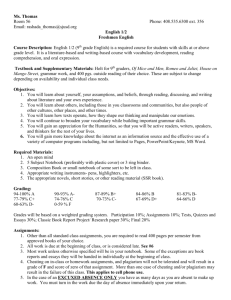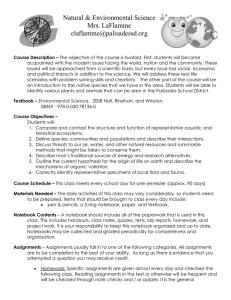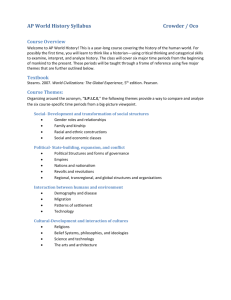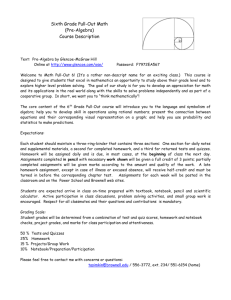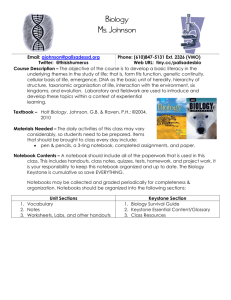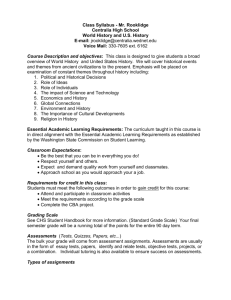Biology – 9th Grade - Palisades School District
advertisement
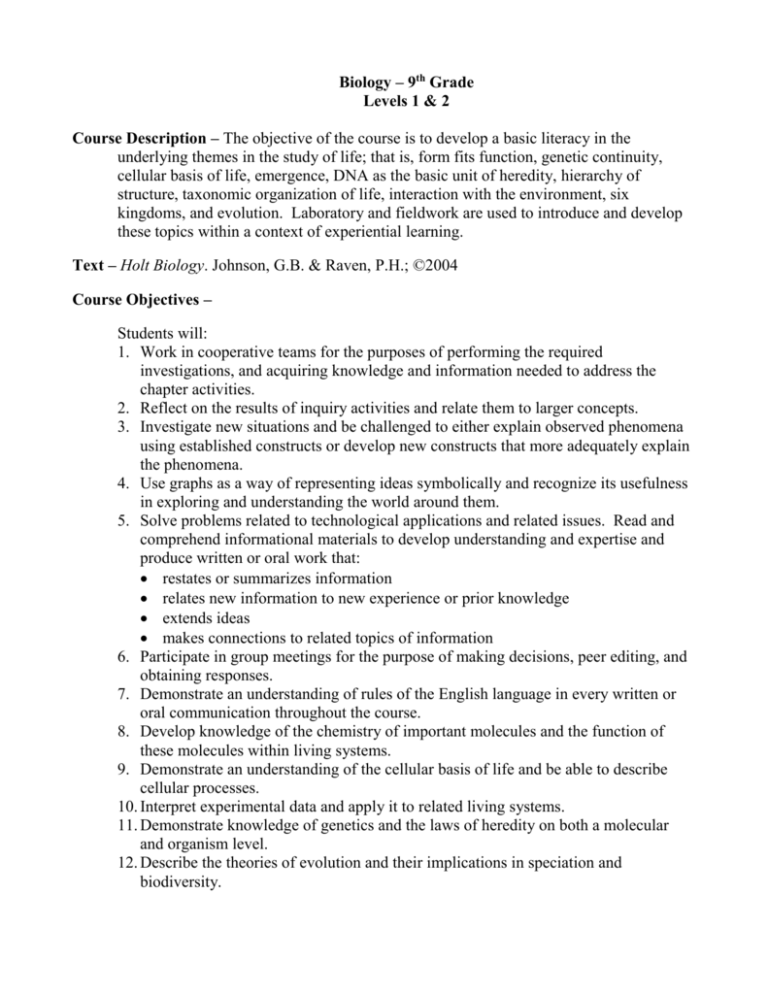
Biology – 9th Grade Levels 1 & 2 Course Description – The objective of the course is to develop a basic literacy in the underlying themes in the study of life; that is, form fits function, genetic continuity, cellular basis of life, emergence, DNA as the basic unit of heredity, hierarchy of structure, taxonomic organization of life, interaction with the environment, six kingdoms, and evolution. Laboratory and fieldwork are used to introduce and develop these topics within a context of experiential learning. Text – Holt Biology. Johnson, G.B. & Raven, P.H.; ©2004 Course Objectives – Students will: 1. Work in cooperative teams for the purposes of performing the required investigations, and acquiring knowledge and information needed to address the chapter activities. 2. Reflect on the results of inquiry activities and relate them to larger concepts. 3. Investigate new situations and be challenged to either explain observed phenomena using established constructs or develop new constructs that more adequately explain the phenomena. 4. Use graphs as a way of representing ideas symbolically and recognize its usefulness in exploring and understanding the world around them. 5. Solve problems related to technological applications and related issues. Read and comprehend informational materials to develop understanding and expertise and produce written or oral work that: restates or summarizes information relates new information to new experience or prior knowledge extends ideas makes connections to related topics of information 6. Participate in group meetings for the purpose of making decisions, peer editing, and obtaining responses. 7. Demonstrate an understanding of rules of the English language in every written or oral communication throughout the course. 8. Develop knowledge of the chemistry of important molecules and the function of these molecules within living systems. 9. Demonstrate an understanding of the cellular basis of life and be able to describe cellular processes. 10. Interpret experimental data and apply it to related living systems. 11. Demonstrate knowledge of genetics and the laws of heredity on both a molecular and organism level. 12. Describe the theories of evolution and their implications in speciation and biodiversity. 13. Explain and compare the structure and function of animal and plant systems and their adaptations. Course Schedule – This class meets every school day for one semester (approx. 90 days) Materials Needed – The daily activities of this class may vary considerably, so students need to be prepared. Items that should be brought to class every day include pen & pencils, a 3-ring notebook, and your textbook. Notebook – A notebook should include all of the paperwork that is used in this class. This includes handouts, class notes, quizzes, tests, lab reports, homework, field / safari journals, and project work. It is your responsibility to keep this notebook organized and up to date. Notebooks may be collected and graded periodically for completeness & organization. Assignments – Assignments usually fall in to one of the following categories. All assignments are to be completed to the best of your ability. Homework: Specific assignments are given almost every day and checked the following class. Reading assignments in the text or otherwise will be frequent and will be checked through note checks and / or quizzes. It is the general expectation that even if no specific assignment is given, students will spend time reviewing notes and other material covered in class. Labs: Throughout the course, activities and labs will be conducted in order to strengthen understanding and develop inquiry skills. Labs may be directed with specific instructions or open-ended allowing students to develop their own procedures. Both formal and informal write-ups may be required at the conclusion of the lab. Quizzes: Quizzes will be used frequently to assess progress. These short assessments may be announced or unannounced. Often, quizzes will be used at the beginning of a class to check homework or at the end of a lesson to check understanding. Tests: Tests will always be announced and usually occur at the end of a unit. Formats of tests vary depending on the material. Tests may be retaken if special arrangements are made with the instructor. Retaking tests are not meant to be a do-over, but as a way to improve your understanding of material. Grades may or may not be improved by retaking tests. Projects: Many units will include various larger projects that are designed to deepen understanding of the content, as well as developing applied skills. Field / Safari Journal: Students will be expected to keep a detailed log of their observations and questions that occur while working in the field. Blackboard: Students will be expected to participate in an online student network. Assignments may be given through this tool and certain assignments will be expected to be handed in electronically. Plagiarism & Cheating – It is the expectation of all students that any work handed in is completely the work of the student. If outside sources are used, they should be properly cited using APA format. Any cases of plagiarism or cheating will be dealt with according to school rules. This includes a zero on the assignment, parent notification, in-school suspension, a parent conference, and the possibility for other academic privileges to be taken away. Grading – Each assignment will be given a numerical value. Larger assignments will be worth more points. At the end of each quarter, grades will be calculated by determining the percentage of points earned from the total possible. Each quarter is worth 40% of the final grade and the final exam / project is worth 20%. Absences – Students are responsible for making up any missed work. All missed work should be completed and turned in a timely manner upon the students return. In some cases time will need to be scheduled after school to make up a labs or other class work. If students know they will miss class in advance, they should ask the instructor for work before the absence. Contact Information & Extra Help– The best method of contacting me is e-mail at mchilton@palisadessd.org. I can also be contacted by phone through voicemail only at 610-847-5131 ext. 2338. I am available most days after school, but please check in advance to be sure. Important information can also be found on my district website. Class Rules & Expectations – All school policies apply. We will develop our own class rules together and adjust them as needed. Generally speaking, everyone should respect each other, respect the physical environment, and respect the learning process. Portfolio Development – Students may wish to document their improvement in science by including certain activities in their portfolio. These activities include lab reports, diagrams and models, group projects and scientific writing. Safety Considerations – Science classrooms can be dangerous and it is vital that students listen to and follow all safety instructions. Students not paying attention to directions put themselves and their classmates at risk. This will not be tolerated. Outline of Course Content – The content of the course will be tied to nine underlying themes of biology which will be infused into each unit. These themes include: Science as a way of thinking; Form fits function; Hierarchy of structure; Living things require energy; The cell is the unit of structure for life; Living things interact with their environment; DNA is the building block of heredity: Unity and diversity: and the core theme, Change through Time. The themes of the course are linked to the content outlined below: Microbiology o Biochemistry o Cell structure Cell Processes o Photosynthesis & Respiration o Cell replication (Mitosis & Meiosis) Evolution o Evidence of Natural Selection o History of Life on Earth Genetics o Patterns of Inheritance o Structure & Function of DNA o Biotechnology Ecology o Ecosystems o Ecological Relationships o Human Impacts on Ecosystems ***Please that the course content may vary to fit the needs of a particular group of students.
